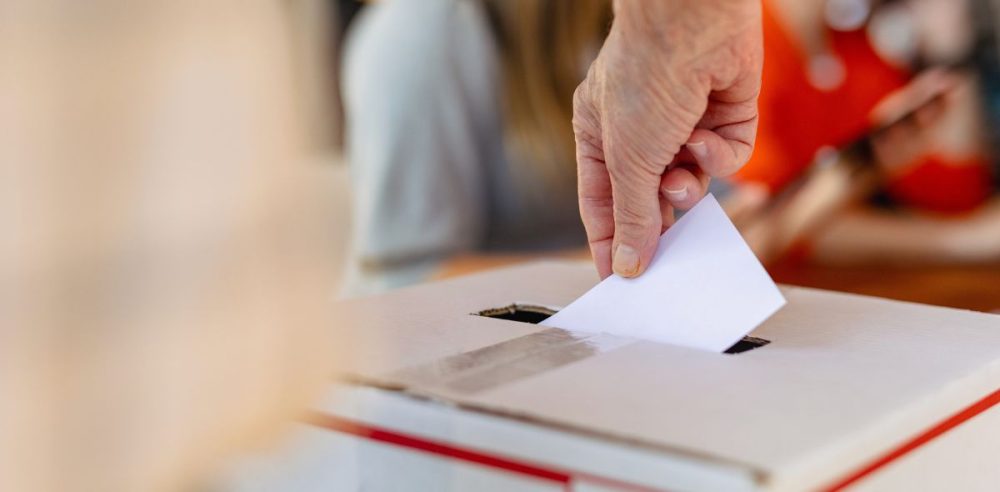(Texas Scorecard) – Texas senators on the State Affairs Committee considered election-related measures, including a measure that would return to the attorney general the power to unilaterally prosecute election crimes.
Senate Bill 1026, filed by State Sen. Bryan Hughes (R-Mineola), stipulates that the attorney general “shall” criminally prosecute election crimes if local district attorneys have not begun proceedings after six months following their notification.
“Under this bill, local law enforcement that would normally submit reports of probable cause to a local prosecutor must also submit these reports to the attorney general,” said Hughes.
“And, upon request of the attorney general, the local prosecuting attorney or law enforcement must also turn over all information regarding their criminal investigations on these offenses,” he added.
Jeff Barr, chief of the attorney general’s election integrity division, argued that for nearly 70 years, since 1951, the Texas attorney general has had concurrent authority to prosecute election crimes through state law.
However, in December 2021, the Texas Court of Criminal Appeals ruled that the attorney general could not prosecute criminal election violations unilaterally without the consent of a local district attorney.
“The majority of the justices, in their opinion, said … ‘Because the statute didn’t say shall, it said the AG may prosecute. Therefore, we’re just interpreting that to mean, well, that means if the local DA gives you consent,’” said Barr.
Barr praised Hughes’ measure for creating an “implied consent” of the local district attorney.
“If the local district attorney, upon receiving a law enforcement report establishing probable cause that an election offense has been committed does not then proceed within six months … then this bill essentially makes that a consent to prosecute to the AG,” said Barr.
He also stressed the importance of adjusting the 1951 statute from reading the attorney general “may” prosecute the alleged crime to “shall” prosecute the alleged crime, returning the state official’s concurrent authority.
State Sen. Brian Birdwell (R-Granbury) said he appreciated Hughes’ measure but had concerns about the attorney general’s discretion being limited to “implied consent.”
“I think it ought to be specified as opposed to implied,” said Birdwell. “So if some future day a district attorney doesn’t do something, the attorney general reviews it, there’s a requirement of some type that the attorney general has to say, ‘Here’s why I nonconcur and I am going to prosecute.’ Or, ‘Here’s why I concur, and I’m not going to prosecute.’”
Hughes sympathized with Birdwell’s concerns and asked Barr if the senator’s idea could be implemented in a future floor amendment without compromising the rest of the measure.
Barr told Hughes it could, and “our office can certainly provide language in that regard.”
Groups like the American Civil Liberties Union of Texas and the Texas Civil Rights Project testified against the measure, arguing that Barr has misconstrued the Court of Criminal Appeals’ 2021 ruling and is pushing to expand the attorney general’s power.
Ken Moore, a former election judge, testified in favor of SB 1026 and said he had firsthand experience with potential election-related crimes across the state.
“If you have local prosecutors who refuse to do their jobs and to prosecute these irregularities, then you’re really against the wall,” said Moore. “Ironically, the Stephens case [from 2021] helps highlight this, because it was the local prosecutor that refused to deal with that case.”
SB 318, filed by State Sen. Brandon Creighton (R-Conroe), would establish an election integrity division in the Texas attorney general’s office. While the office already has election integrity attorneys, they are currently organized under the criminal division.
“Not necessarily knowing if future AGs will make sure that this priority set remains of the highest, in protecting the public against those types of incidences,” said Creighton.
Barr warned that because election crimes are a seasonal occurrence, creating a new division could improperly steward taxpayer money.
“My concern with the bill is that I question whether it would be specifically funded for only election prosecution causes or matters,” said Barr.
Barr added that the 2021 ruling by the Texas Court of Criminal Appeals and recent federal court rulings that limit state prosecutions of vote harvesting have also limited election integrity attorneys’ abilities.
State Sen. Tan Parker (R-Flower Mound) asked Barr if there was a way to work out internally how workload could be shifted seasonally.
“I hope so,” replied Barr. “I think there would need to be some flexibility for us to be able to do that.”
Emily Eby French, director of policy for Common Cause Texas, testified in opposition to SB 318. She specifically challenged the notion that election integrity attorneys have been effective in recent years under Attorney General Ken Paxton.
“From October 2020 to September 2021, the attorney general’s team of lawyers worked on more than 20,000 hours of election cases and they closed three. They also closed only three per year in 2016, 2017, and 2019,” said French.
“In the 2022-2023 Fiscal Year, the unit prosecuted four cases and spent nearly $2.3 million. From September 2023 to August 2024, they closed just two cases and spent about $1 million,” she added.
Senators also considered other election-related measures.
SB 108, filed by State Sen. Bob Hall (R-Edgwood), would clarify state law and standardize the process for how elections clerks are appointed.
“In past elections, some counties allowed for the presiding judge of a polling location to be the sole appointer for election clerks, which could create an unbalanced system where irregularities could occur,” said Hall.
“SB 108 would ensure the sharing of political power, creating a procedure where both the judge and the alternate judge may appoint clerks,” he added.
Hall’s measure would also allow the alternate presiding judge to stand in for the presiding judge if he or she is not present and permit the alternate presiding judge to “freely occupy or observe” the voting location.
SB 533, filed by State Sen. Kevin Sparks (R-Midland), would require an election for the issuance of bonds or tax increases to be held on the November uniform election date.
Bond elections can be held throughout the year. However, according to the Texas Public Policy Foundation, dates set outside the regular election season typically have far lower turnout.
James Quintero, a policy director for TPPF’s Taxpayer Protection Project, called the measure “commonsense election reform” while testifying in favor of SB 533.
“Banquete ISD’s $86 million proposal received just 159 yes votes,” said Quintero. “Elsewhere, the city of Donna’s $114.7 million proposal received just 614 votes.”
“Large expensive debt measures are being approved by just a handful of people in non-November elections,” he added.
SB 511, filed by State Sen. Paul Bettencourt (R-Houston), would ban, with minor exceptions, an officer or employee of the state or a political subdivision from distributing voter registration cards to a person who did not request them.
“If someone requests it, the government can send it to them. But quite frankly, in lieu of that we’ve got volunteer deputy registrars, high school deputy registrars, political parties, candidates everywhere, and they can do that work unsolicited,” said Bettencourt.
“But government shouldn’t be putting their thumb on the scale without a solicitation from the voter just like we do with absentee ballot locations,” he added.
Kyle Sinclair, vice chair of the Republican Party of Bexar County, testified in favor of SB 511 and explained his local party’s experience dealing with automatic voter registration.
“There’s an organization called Civic Government Solutions that got a contract for $400,000 to register 220,000 members in Bexar County to do what they thought was going to … increase their voter turnout,” said Sinclair.
According to Sinclair, the organization’s founder also led a partisan group and communicated with at least 40 other Texas counties with another four under contract.
“We also found out that the organization was uncovered in four different states doing this exact very thing,” added Sinclair.
Paxton launched an investigation in September 2024 into the Bexar County Commissioners Court for contracting with Civic Government Solutions.
The measures were left pending in committee until a later date.


